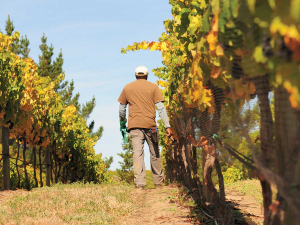Govt to rethink farm health and safety rules with practical reforms
Farmers are welcoming new Government proposals to make farm health and safety rules more practical and grounded in real-world farming.
 A leading health and safety consulting says that Covid-19 has led to a softening of the 'harden up' attitude.
A leading health and safety consulting says that Covid-19 has led to a softening of the 'harden up' attitude.
The Covid crisis has helped sharpen focus on employee wellbeing, says a wine industry health and safety consultant.
Rebecca Condon, of SHR Consulting, says the enhanced care and attention required during the 2020 vintage has helped soften New Zealand’s “harden up” culture, which could drive people to go to work with a cold or while battling the flu. It has also served to improve communication channels for staff in some companies, and to propel stronger health and safety procedures, she says.
Health and safety was already in a process of change, says Rebecca, referencing a ‘Safety II’ philosophy geared towards care rather than simply preventing accidents. “It’s much more about people and, how do we care for people?” That ethos came to the fore during Covid-19, with care becoming a major priority, and has continued for some companies since the first lockdown earlier this year ended. A number of wine companies recently sent staff on a course run by the Mental Health Foundation, which looked at improving wellbeing in the workplace. Rebecca says it’s a topic she is increasingly asked about by the companies she works with.
Doing better for work wellbeing may come down to company culture, she says. “Do you have a culture where people feel supported and where people can speak up if stress is impacting on their health?” Staff can have a lot going on outside work, and are not robots able to leave the personal at home. “It’s about having a workplace where people can raise the issues in a safe way and say ‘I have stuff going on’, so the business can support them and they can continue to do their job.”
Covid-19 may have enhanced that ability in some companies, because health discussions became common in the workplace, along with conversations about fears of children going to school, for example. “That opened up a safe space for people to talk about those things, which flowed on to businesses.”
Recent years have also seen wine companies, in general, abide by their legal requirement to do health checks each year, to ensure anyone working around a hazard, such as loud noises, are protected sufficiently. She says some smaller wineries are not doing it and might not be aware of their obligation, “but what I am seeing, which is great, is a lot of business going beyond the bare minimum”.
The goal now is to ensure companies stay on track in working to ensure wellbeing at work, whether by improving communication channels or pushing the hygiene messages ramped up because of Covid-19, says Rebecca. “We must do all we can to ensure we don’t allow complacency to creep in when it comes to our fight against Covid-19 and our commitment to maintaining a work environment where our people feel safe and supported.”

The end of the year is fast approaching, so here are some thoughts on a few of the significant developments…

OPINION: When I moved to Marlborough two decades ago, I found countless lines of tidy vines, neatly mowed and carefully…
The large 2025 harvest will exacerbate the wine industry's "lingering" supply from recent vintages, New Zealand Winegrowers Chief Executive Philip…
If you find a new consumer in a developed wine market, you are taking them from someone else, says Blank…
OPINION: Sauvignon Blanc was famously introduced to New Zealand by Ross Spence of Matua Valley, and then serendipitously planted in…